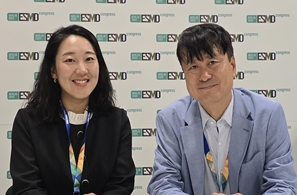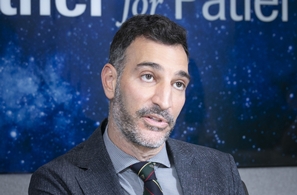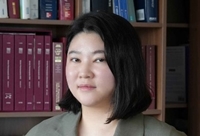- Bayer Korea marks 70th year, preparing for 100-yr milestone
- by Whang, byung-woo | translator Hong, Ji Yeon | Feb 10, 2025 05:50am
The company plans to enhance the capacity of treatments already launched in the market and its new growth driver pipeline, aiming for long-term and continuous business growth.
Additionally, as the importance of the ESG business has been stressed, the company pursues sustainable business by setting specific directions.
Bayer launched in South Korea after the Korean war…Bayer known for Aspirin
Bayer Korea, the South Korean subsidiary of the global life sciences company Bayer, entered the Korean market in 1955, starting with its crop protection business.
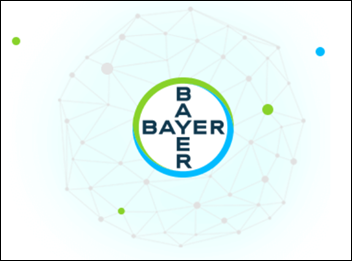
In the 1960s, Bayer products began manufacturing in South Korea through a technology partnership with Hanil Pharmaceutical. This period marks the introduction of Bayer products into the Korean market.
The representative product at the time was aspirin, a widely used pain reliever with over 120 years of history. Historical records also indicate that Bayer contraceptives were distributed to public health centers in South Korea.
Bayer's full-scale business expansion took place in 1972 with the establishment of Bayer Pharmaceuticals Korea. The company acquired 30 locally produced products from Hanil Pharmaceutical, including Bayer Aspirin, extending its business into the healthcare sector.
In 1989, Bayer Korea was officially established as a corporation. Entering the 2000s, the company expanded its portfolio through successive mergers and acquisitions, including Aventis CropScience, Roche's OTC division, Schering Korea, MSD Consumer Care, and Monsanto. These acquisitions solidified Bayer Korea's position as a leading global life sciences company with a broader and more advanced product lineup.
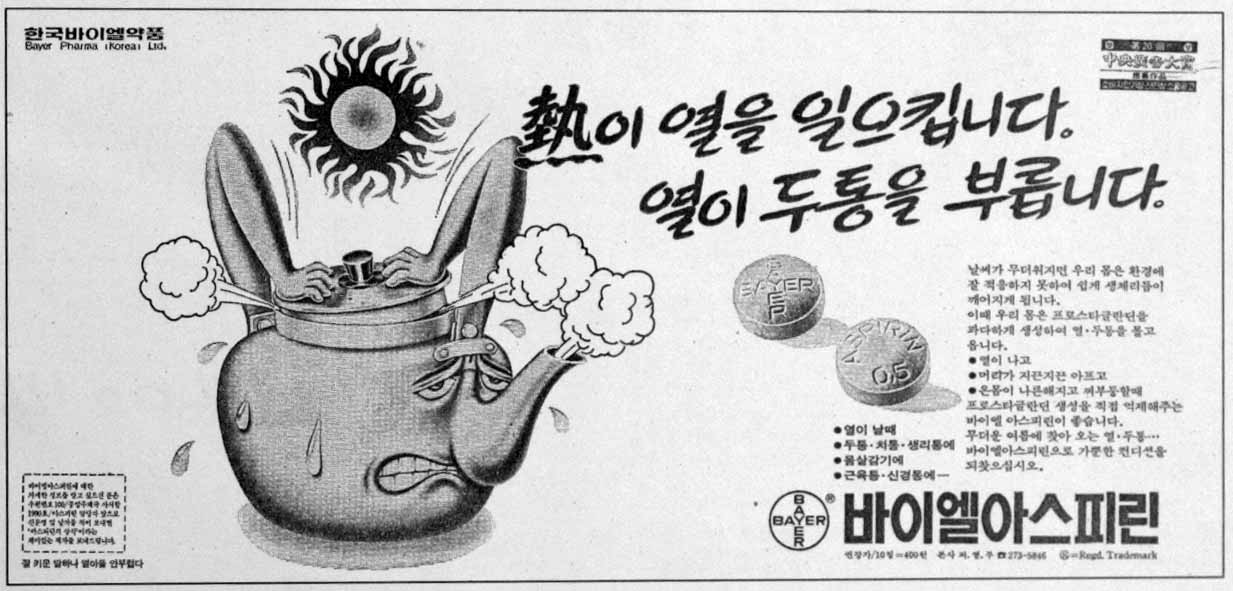
As of February 2025, Bayer Korea holds a total of 62 pharmaceutical products, including prescription and over-the-counter (OTC) medications.
One of Bayer Korea's key products in recent years is Eylea (aflibercept), a treatment for age-related macular degeneration (AMD). In 2023, Eylea is a blockbuster medication that generated KRW 96.8 billion in sales in South Korea.
However, the company faces increasing competition from next-generation therapies and biosimilars that challenge Eylea's market dominance. Expanding sales growth remains one of Bayer Korea's concerns.
Based on the company report, Bayer's sales for the past four years amounted to ▲ KRW 332.6 billion in 2020 ▲ KRW 340.1 billion in 2021 ▲KRW 358.0 billion in 2022 ▲ KRW 347.6 billion in 2023.
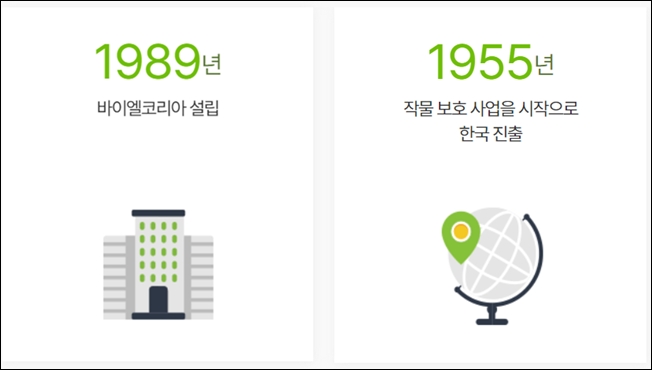
Bayer in need of a new growth driver…prepares for a new generation of pharmaceuticals
As the pharmaceutical landscape continues to evolve rapidly, Bayer has been transitioning into a more agile organization since last year to adapt to environmental changes quickly.
An agile organization breaks down departmental barriers, forming multifunctional teams integrating marketing·sales·operations within the same division. This structure enables greater flexibility and responsiveness to meet the demands of a fast-changing market environment.
A Bayer Korea representative said, "Bayer Korea has been focusing on strengthening the foundation for collaboration among employees to build a better future together."
One of the most significant changes for Bayer Korea is the appointment of JinA Lee as the company’s first Korean CEO since its entry into the Korean market.
Lee's appointment highlights the increasing importance of the Korean market and its strong R&D ecosystem, including early- and late-stage clinical trials and real-world data (RWD) studies.
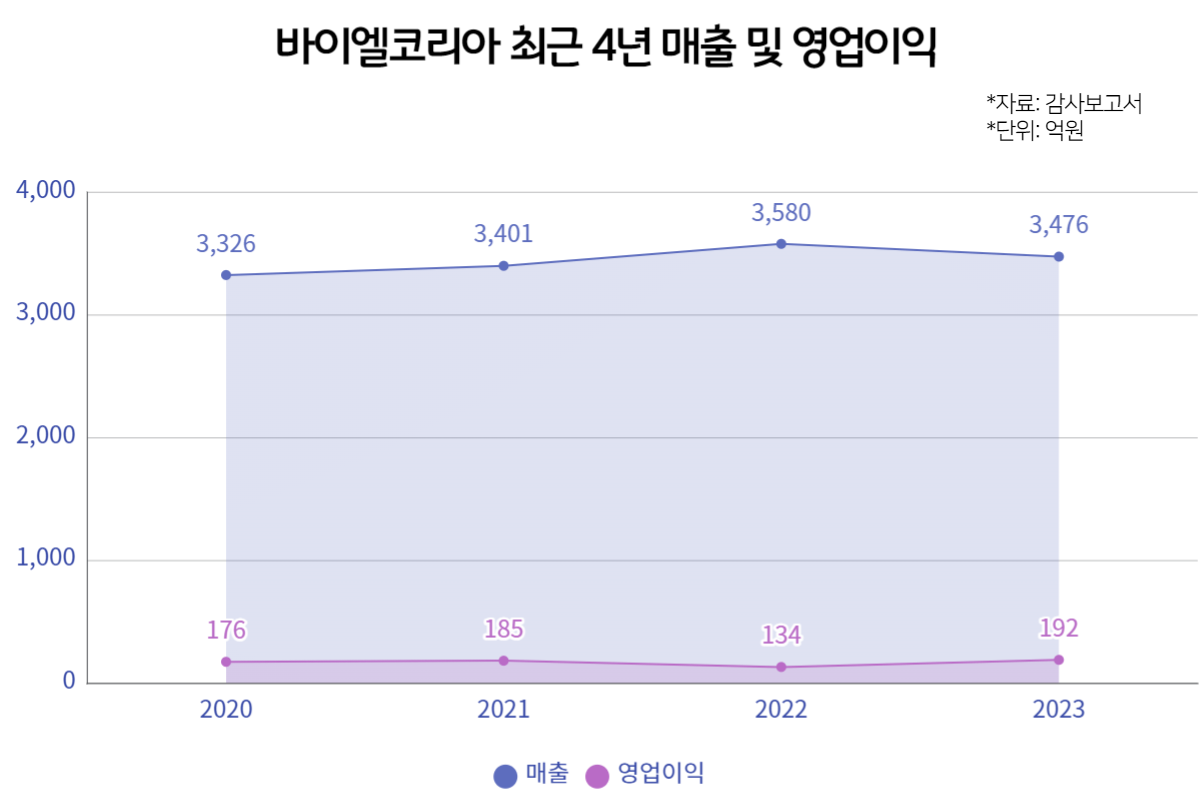
A notable achievement under Lee's leadership is Kerendia, ranked second in outpatient prescription sales among products that received reimbursement in 2024, making a strong debut in its first year as a reimbursed drug.
Additionally, high-dose Eylea (8mg), which extends dosing intervals to 20 weeks, entered the reimbursement list earlier than expected in October last year, helping Bayer maintain its influence in the retinal disease market.
Also, Verquvo, a heart failure treatment, is established as part of a new generation of therapies, securing Bayer's future growth.
This year, Bayer Korea plans to address unmet medical needs in the Korean market and improve patient access to innovative drugs, such as Nubeqa, which has strong market potential.
A Bayer Korea representative stated, "In the healthcare sector, Bayer is committed to delivering innovative products and services through research and development that spans disease diagnosis to prevention and treatment. We are strengthening our expertise in cardiovascular, renal, and oncology treatments while expanding into new therapeutic areas with novel treatment options to ensure continuous growth."
Bayer Korea aims for the next leap, focusing on 'sustainable mangagement'
Bayer Korea, as it celebrates its 70th anniversary, focuses on 'sustainability' for long-term success.
In addition to corporate social responsibility activities, the company is committed to sustainable organizational growth, driven by employee-led campaigns.
According to Bayer Korea’s report released in December, the company is actively engaged in activities aligned with its four sustainable development goals: ▲Ending hunger ▲Healthcare ▲Climate change response ▲Gender equality and diversity.
For instance, the company pursues hunger relief efforts through a partnership with World Vision, supporting underprivileged children through the "Love Lunchbox" volunteer program. This initiative has been expanded into a year-long challenge, where a team of seven employees participates monthly in preparing meal ingredients, cooking, packaging, and cleaning up.
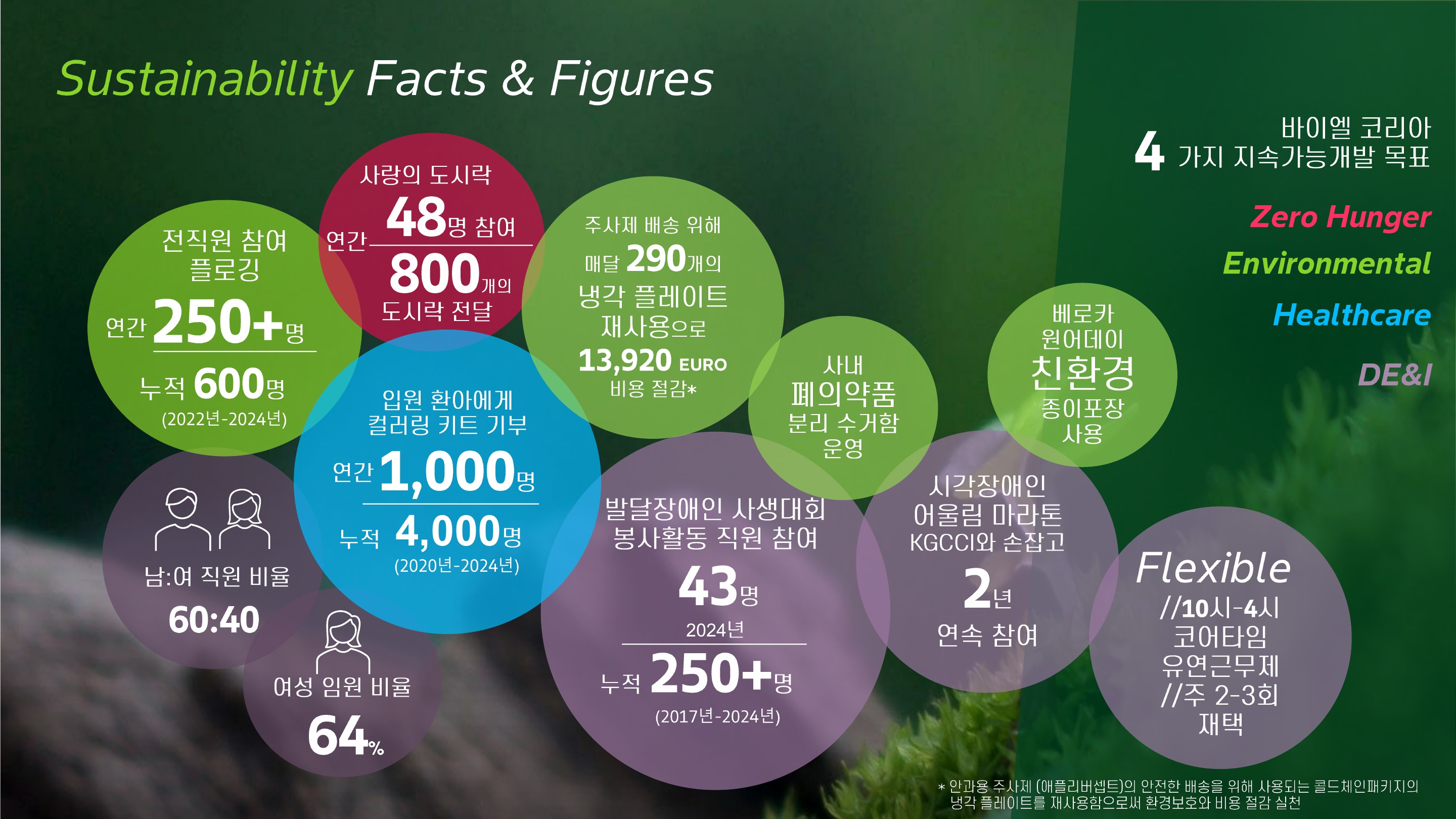
Additionally, volunteer activities such as an art contest for individuals with developmental disabilities, the Unity Marathon with visually impaired participants, and the Proper Disposal of Expired Medicines Campaign were conducted last year.
Lee stated, "Bayer Korea's sustainability report holds the greatest significance not in the scale of its outcomes but in our employees' voluntary and active participation. Through this initiative, we have collectively shared Bayer's vision and goals across the company, systematically organized our achievements, and laid the groundwork for developing more advanced strategies in the future."
Lee added, "Bayer Korea is undergoing a transitional phase as we introduce a new generation of pipeline products. We aim to successfully establish these new treatments in the market to improve patients' lives while building a strong foundation to develop further innovative therapies."
-

- 0
댓글 운영방식은
댓글은 실명게재와 익명게재 방식이 있으며, 실명은 이름과 아이디가 노출됩니다. 익명은 필명으로 등록 가능하며, 대댓글은 익명으로 등록 가능합니다.
댓글 노출방식은
댓글 명예자문위원(팜-코니언-필기모양 아이콘)으로 위촉된 데일리팜 회원의 댓글은 ‘게시판형 보기’와 ’펼쳐보기형’ 리스트에서 항상 최상단에 노출됩니다. 새로운 댓글을 올리는 일반회원은 ‘게시판형’과 ‘펼쳐보기형’ 모두 팜코니언 회원이 쓴 댓글의 하단에 실시간 노출됩니다.
댓글의 삭제 기준은
다음의 경우 사전 통보없이 삭제하고 아이디 이용정지 또는 영구 가입제한이 될 수도 있습니다.
-
저작권·인격권 등 타인의 권리를 침해하는 경우
상용 프로그램의 등록과 게재, 배포를 안내하는 게시물
타인 또는 제3자의 저작권 및 기타 권리를 침해한 내용을 담은 게시물
-
근거 없는 비방·명예를 훼손하는 게시물
특정 이용자 및 개인에 대한 인신 공격적인 내용의 글 및 직접적인 욕설이 사용된 경우
특정 지역 및 종교간의 감정대립을 조장하는 내용
사실 확인이 안된 소문을 유포 시키는 경우
욕설과 비어, 속어를 담은 내용
정당법 및 공직선거법, 관계 법령에 저촉되는 경우(선관위 요청 시 즉시 삭제)
특정 지역이나 단체를 비하하는 경우
특정인의 명예를 훼손하여 해당인이 삭제를 요청하는 경우
특정인의 개인정보(주민등록번호, 전화, 상세주소 등)를 무단으로 게시하는 경우
타인의 ID 혹은 닉네임을 도용하는 경우
-
게시판 특성상 제한되는 내용
서비스 주제와 맞지 않는 내용의 글을 게재한 경우
동일 내용의 연속 게재 및 여러 기사에 중복 게재한 경우
부분적으로 변경하여 반복 게재하는 경우도 포함
제목과 관련 없는 내용의 게시물, 제목과 본문이 무관한 경우
돈벌기 및 직·간접 상업적 목적의 내용이 포함된 게시물
게시물 읽기 유도 등을 위해 내용과 무관한 제목을 사용한 경우
-
수사기관 등의 공식적인 요청이 있는 경우
-
기타사항
각 서비스의 필요성에 따라 미리 공지한 경우
기타 법률에 저촉되는 정보 게재를 목적으로 할 경우
기타 원만한 운영을 위해 운영자가 필요하다고 판단되는 내용
-
사실 관계 확인 후 삭제
저작권자로부터 허락받지 않은 내용을 무단 게재, 복제, 배포하는 경우
타인의 초상권을 침해하거나 개인정보를 유출하는 경우
당사에 제공한 이용자의 정보가 허위인 경우 (타인의 ID, 비밀번호 도용 등)
※이상의 내용중 일부 사항에 적용될 경우 이용약관 및 관련 법률에 의해 제재를 받으실 수도 있으며, 민·형사상 처벌을 받을 수도 있습니다.
※위에 명시되지 않은 내용이더라도 불법적인 내용으로 판단되거나 데일리팜 서비스에 바람직하지 않다고 판단되는 경우는 선 조치 이후 본 관리 기준을 수정 공시하겠습니다.
※기타 문의 사항은 데일리팜 운영자에게 연락주십시오. 메일 주소는 dailypharm@dailypharm.com입니다.
- [Op-Ed] Patients, no time left for 'new drug comb therapies'
- Special Contribution | Eo, Yun-Ho



